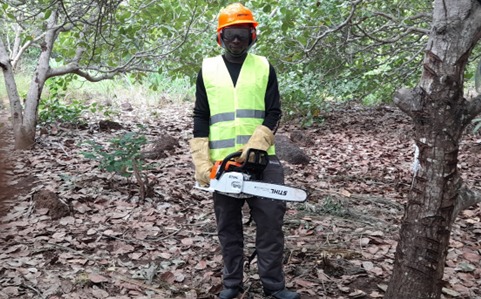By David Lederer, Project Manager, Red River Foods
Yao Wilfried Kouadio, 26, lives in a small community in the Sakassou region of Côte d’Ivoire called Konankro, located in the country’s dense, lush, central region where cashew trees dot the landscape. While sun-loving cashew trees grow quickly here, without appropriate spacing they fail to produce their full potential yield. In Sakassou, this phenomenon is all too common. Without the meticulous pruning required to help them grow, farmers can’t derive the full benefits of the crop.
As the son of a farmer, Yao was all too familiar with the complexities of growing cashew. That’s why he began training as a chainsaw operator in 2015 in order to help local farmers prune and thin their cashew orchards. However, knowledge gaps remained around good agricultural practices that enhance productivity and make basic farm operations like harvesting nuts simpler on local orchards.
For over a decade, Red River Foods has been implementing sustainability programs in West Africa. In tandem with its newly created West Africa Cashew Export Development Initiative, Red River Foods is working to improve the capacity of smallholder farmers, processors, and suppliers working in the West African cashew industry. Ultimately, the initiative aims to catalyse sustainable exports of value-added cashew kernels sourced from West Africa to generate large-scale direct trade and investment between West Africa and the United States, in line with the goals of the U.S. Government’s Prosper Africa initiative.
The West Africa Cashew Export Development Initiative is partially funded by a $3 million grant from Prosper Africa through the USAID West Africa Trade & Investment Hub, which has been matched by Red River Foods. Together, they are undertaking a variety of activities, including the construction and scaling of processing facilities and expansion of raw cashew nut sourcing through farmer and supplier networks. As part of these efforts, Red River Foods is training farmers on good agricultural practices like pruning and thinning, supported by community members like Yao.

Working with trained chainsaw operators like Yao helps local farmers understand the importance of regular orchard maintenance and improves access to these essential services in the area. With the support of Red River Foods staff, he and two others have learned improved techniques for pruning and thinning of orchards in nearby Bouake. Pruning techniques included the removal of dead branches and the creation of light windows.
To translate theory to practice, Red River Foods created a control and treatment version of a 2-hectare orchard to enable farmers to compare and realise the benefits of these approaches. Each participating orchard is measured and split into two roughly equal parcels. One parcel was thinned by Yao and the other was left as a control, enabling farmers in the area to have a visible comparison of the positive impacts of pruning and thinning on yields. Over time, Red River Foods hopes that these trainings and real-life examples will encourage farmers in target communities to adopt more intensive maintenance practices to improve cashew yields.
In 2022, Red River Foods will further scale this program across communities participating in the West Africa Cashew Export Development Initiative.

